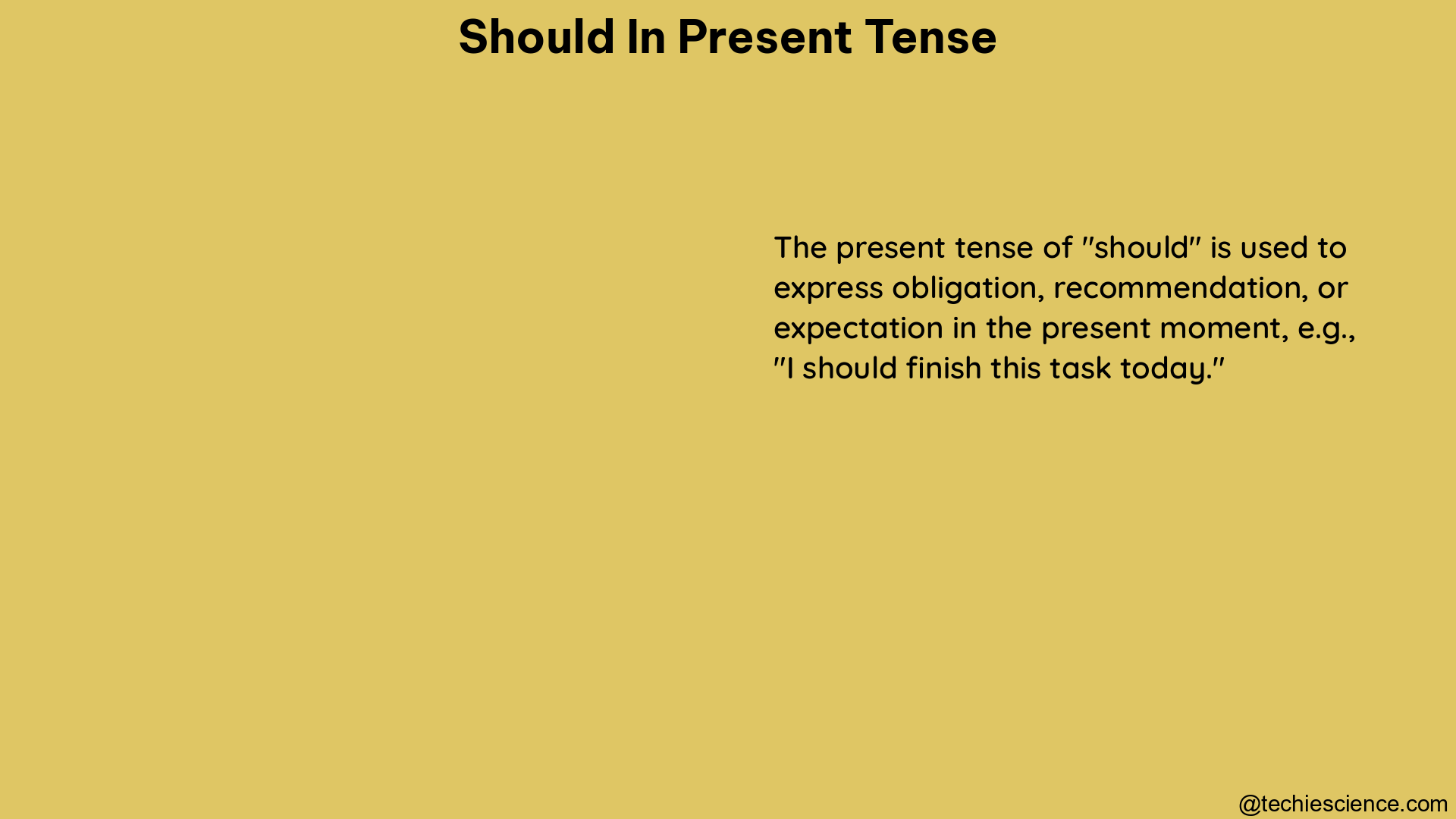The present tense of “should” is a versatile modal verb used to express advice, recommendations, and obligations. It is an essential part of the English language, and understanding its proper usage is crucial for effective communication. In this comprehensive guide, we will delve into the intricacies of using “should” in the present tense, providing you with a thorough understanding of its rules, usage, and examples.
Modal Verb Characteristics
- Non-Inflectional: As a modal verb, “should” does not take any endings like -s, -ed, or -ing. It remains the same regardless of the subject or tense.
- Base Form: When using “should” in the present tense, it is always followed by the base form of the verb, without any additional endings.
- Inversion for Questions: To form questions using “should” in the present tense, the subject and the modal verb are inverted.
Expressing Advice and Recommendations

One of the primary uses of “should” in the present tense is to provide advice or make recommendations. This can be done in a variety of contexts, such as:
- Suggesting a Course of Action:
- You should try the new Vietnamese restaurant downtown.
- We should leave now to avoid traffic.
-
You should wash white clothes separately from brightly colored clothes.
-
Giving Advice:
- To improve your writing, you should focus on developing a clear thesis statement.
- If you want to stay healthy, you should exercise regularly and eat a balanced diet.
-
When traveling abroad, you should research the local customs and etiquette.
-
Recommending a Behavior or Action:
- Students should arrive at the exam hall at least 15 minutes early.
- Employees should refrain from using their personal phones during work hours.
- Drivers should always wear their seatbelts and obey traffic laws.
Expressing Obligations and Responsibilities
In addition to providing advice and recommendations, “should” in the present tense can also be used to express obligations or responsibilities. This usage often implies a sense of duty or expectation. Examples include:
- Personal Obligations:
- I should be working on my project right now.
- You should be studying for your upcoming exam.
-
She should be attending the company meeting this afternoon.
-
Societal or Institutional Expectations:
- All citizens should respect the laws and regulations of their country.
- Employees should adhere to the company’s code of conduct.
- Students should maintain a minimum GPA to remain eligible for scholarships.
Negative Form: “Should Not” and “Shouldn’t”
The negative form of “should” in the present tense is expressed using “should not” or the contracted form “shouldn’t” followed by the base form of the verb. This is used to express advice or recommendations against a particular action or behavior. Examples include:
- Advice Against an Action:
- You shouldn’t eat too much sugar if you want to maintain a healthy diet.
- The test shouldn’t take longer than an hour to complete.
-
Students shouldn’t use their phones during class time.
-
Recommendations to Avoid Certain Behaviors:
- Drivers should not use their phones while operating a vehicle.
- Employees should not disclose confidential information to unauthorized parties.
- Children should not stay up late on school nights.
Exceptions and Nuances
While the general rules for using “should” in the present tense are straightforward, there are a few exceptions and nuances to be aware of:
- Expressing Probability: In some cases, “should” can be used to express a probability or likelihood, rather than an obligation or recommendation.
- The weather should be sunny tomorrow.
-
The new product should be available in stores by the end of the month.
-
Expressing Uncertainty: “Should” can also be used to express uncertainty or a lack of confidence in a statement.
- The meeting should start at 2 pm, but I’m not entirely sure.
-
The package should arrive by tomorrow, but there may be a delay.
-
Expressing Conditionality: “Should” can be used in conditional statements to indicate a hypothetical or imagined scenario.
- If you study hard, you should be able to pass the exam.
- Should the situation escalate, we should be prepared to take immediate action.
Conclusion
The present tense of “should” is a versatile and essential part of the English language. By understanding its rules, usage, and nuances, you can effectively express advice, recommendations, and obligations in your communication. This comprehensive guide has provided you with the necessary knowledge to master the use of “should” in the present tense, empowering you to communicate with clarity and precision.
Reference:
- https://www.lsi.edu/en/should-and-should-not
- https://ell.stackexchange.com/questions/102620/should-have-in-reference-to-the-present
- https://www.englishclass101.com/lesson/english-grammar-made-easy-107-using-should-in-the-past-and-future?lp=17
Hey! I am Arpita Bose Roy. My qualifications are M.A. in English with B. Ed. in both general education and special education. I have 2 years of experience as a “language analyst” at IIT Kharagpur and 4 years of experience as an “Academic Content Developer” at IIT Kharagpur. Currently, I am working as an academic writer at Lambdageeks.